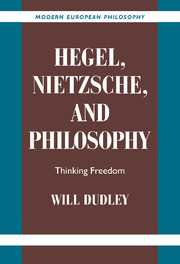Book contents
- Frontmatter
- Contents
- Acknowledgments
- List of Texts, Translations, and Abbreviations
- Introduction: Freedom and Philosophy
- PART I FREEDOM IN AND THROUGH HEGEL'S PHILOSOPHY
- PART II FREEDOM IN AND THROUGH NIETZSCHE'S PHILOSOPHY
- 5 The Place of Freedom in Nietzsche's Philosophy
- 6 The Freedom of Willing: Decadence and Nobility
- 7 Freedom beyond Willing: From Nobility to Tragedy
- 8 Freedom through Nietzsche's Philosophy
- Conclusion: Philosophy and Freedom
- Notes
- Index
7 - Freedom beyond Willing: From Nobility to Tragedy
Published online by Cambridge University Press: 09 July 2009
- Frontmatter
- Contents
- Acknowledgments
- List of Texts, Translations, and Abbreviations
- Introduction: Freedom and Philosophy
- PART I FREEDOM IN AND THROUGH HEGEL'S PHILOSOPHY
- PART II FREEDOM IN AND THROUGH NIETZSCHE'S PHILOSOPHY
- 5 The Place of Freedom in Nietzsche's Philosophy
- 6 The Freedom of Willing: Decadence and Nobility
- 7 Freedom beyond Willing: From Nobility to Tragedy
- 8 Freedom through Nietzsche's Philosophy
- Conclusion: Philosophy and Freedom
- Notes
- Index
Summary
The Incomplete Freedom of Nobility
In the previous chapter, we examined why Nietzsche understands freedom to require that one forge one's own will. Failing to do so amounts to being condemned to one of two styles of decadent dependence: either one is determined by a will forged and imposed externally, or one is determined by instincts and drives that, subject to no will, serve as master and tyrant.
We also examined what forging one's own will involves. Primarily, it involves giving birth to oneself as a living whole, by simplifying and integrating the chaos that results from the destruction of the moral will. For this process to succeed, we saw that one must be selfish. One must build a wall that excludes what one cannot integrate, and one must forget that which one encounters but cannot use in the building of the wall. Furthermore, once built, the wall must also serve to retain what has been integrated; one must remember what one places in one's will. If one employs the combination of forgetfulness and memory appropriate to one's strength, to one's ability to incorporate the external without destroying the whole that one is developing, one will succeed in giving oneself a measure. This measure, the limit that determines what one can incorporate and what one must exclude, is one's own will, from which one evaluates, and the evaluations of which one obeys.
Finally, we also examined the consequences of forging one's own will.
- Type
- Chapter
- Information
- Hegel, Nietzsche, and PhilosophyThinking Freedom, pp. 175 - 212Publisher: Cambridge University PressPrint publication year: 2002

